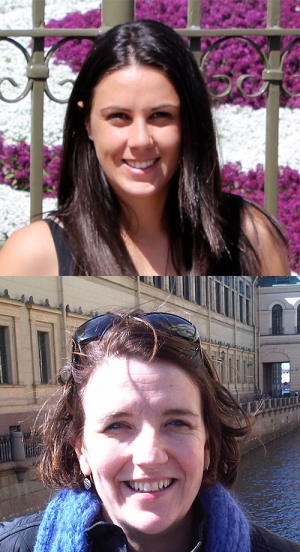Making a difference
Research news
Two research projects that both focus on health and well-being have taken out this year’s Neil Archbold Memorial Travel Awards.
The awards were presented to Deakin PhD candidates Ms Kathryn Matthews, for her work on malarial parasites, and Ms Adrienne Margarian, for her study of the effect of countertransference on the body of therapists.
The awards acknowledge “outstanding peer-reviewed journal articles.” Each year one candidate is selected from the Humanities and Social Sciences, and one from the Science disciplines, with recipients awarded $3000, to fund research-related travel during their candidature.
Tackling malaria
Based within Deakin’s School of Medicine, Ms Kathryn Matthews will use her travel award to present data from her publication, entitled “PTEX is an essential nexus for protein export in malaria parasites,” at the American Society of Tropical Medicine and Hygiene conference in New Orleans, USA, during November 2014.
Ms Matthews has been a key player in the ground-breaking research - led by Associate Professor Tania de Koning-Ward in the School of Medicine - that has the potential to eradicate the malaria parasite.
The breakthrough made international headlines in July this year, with Ms Matthews being a joint first author of the paper announcing the findings in “Nature.” She has also authored papers in “Molecular Microbiology” and “Plos One.”
“I’d like to highlight the amazing efforts of my primary supervisor and Principal Investigator Associate Professor Tania de Koning-Ward, as well as my associate supervisor Dr Ming Kalanon, who have provided a solid grounding for this research and continue to assist my development as an independent researcher,” said Ms Matthews.
Ms Matthews’ journey to science research has been somewhat circular. She completed a diploma in art before deciding to pursue her first love and enrolling in a degree in science. She is now firmly on her path and hopes to complete a post-doctorate in parasitology after her PhD.
“My passion for science is to make a difference. Being published in ‘Nature’ was wonderful, but it was not my primary goal,” she said.
“I simply want to contribute to making a difference where it counts, so that we have a better chance of treating or preventing malaria and other diseases.”
Understanding countertransference
Ms Adrienne Margarian, who is completing her PhD in Psychoanalytic Studies within Deakin’s School of Humanities and Social Sciences, hopes to present data from her thesis “A cross-cultural study of somatic countertransference” at an international conference in 2015.
A Sydney-based psychologist and psychotherapist, Ms Margarian is researching the effects of somatic countertransference, a form of unconscious communication between a client and their psychotherapist, on the body of the therapist.
“We are only just beginning to understand that the psychotherapeutic process can cause physical symptoms in the therapists, such as headaches, nausea or sleepiness,” she explained.
“This understanding has the potential to help psychotherapists better understand the unconscious process occurring in the psychotherapy session.”
In order to research whether therapists from different cultures experience similar symptoms to “western” psychotherapists, Ms Margarian interviewed 29 Chinese psychotherapists and several leading international experts in the field.
Her research found that the Chinese psychotherapists do experience their body differently during psychotherapy.
“They tended to take a more holistic approach to the psychotherapy process and were more likely to conflate physical sensations with feelings, such as anger or distress,” she explained.
“The use of the body as a tool in psychoanalysis is currently a hot topic. I hope that my research will help psychotherapists to interpret the unconscious effects of therapy on their body - and understand how important it is that they take good care of themselves.”
Share this story
 Ms Kathryn Mathews (top) and Ms Adrienne Margarian.
Ms Kathryn Mathews (top) and Ms Adrienne Margarian.
